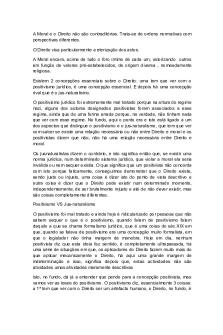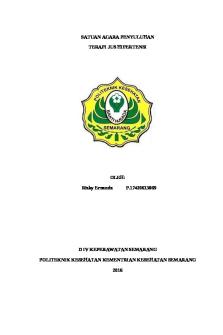JUS 455 Additional Readings PDF

| Title | JUS 455 Additional Readings |
|---|---|
| Author | Am De |
| Course | Legal Traditions |
| Institution | Southern New Hampshire University |
| Pages | 4 |
| File Size | 80.1 KB |
| File Type | |
| Total Downloads | 98 |
| Total Views | 134 |
Summary
Notes on all of the additional readings (articles, PDFs, anything not in the textbook) for the whole course...
Description
PDF: The Importance of Ethics in Criminal Justice
Ethics present a way to make moral choices when you are uncertain about what to do
They allow you to quickly recognize ethical consequences, which helps with management and policy decisions, and is particularly important for those in positions of power
Normative Ethics: Act morally, using reason to help you decide
Ethical Relativism: Right and wrong varies between cultures and people
Cultural Relativism: Every cultural has its own moral code, and that is okay
Ethical Absolutism: There is an eternal and unchanging moral law that is the same for all people, times, and places
Ethical Pluralism: Understand, tolerate, stand up against evil, admit fallibility, there is no “one truth,” but rather many truths in most situations
Divine Command: The belief that god decides what is right and wrong
Ethics have been viewed as a product of natural law and have been used as law
Ethical problems in criminal justice include the abuse of authority, the relationship between personal and professional interests, commitments to clients, criminal justice and public policy, policing policies, information sharing, human rights issues, and media reporting
ARTICLE: Rethinking Ethics in Law Enforcement
Virtue Ethics and Bad Apples One’s actions are a reflection of their character, so if an officer acts badly, it is because they are bad people and should not have been hired
Ethical training could also help prevent these issues
Pressure from authorities and the impact of social learning from those in status and power
Officers can cognitively rationalize their actions through the denial of the victim or injury (“it’s not hurting anyone”), the denial of responsibility (“there was nothing I could do”), social weighting (“at least I’m not as bad as this other guy”) and through moral justification (“these people are criminals and deserve this”)
Law enforcement needs to foster a culture of ethics
ARTICLE: The Oath of Honor
The oath of honor is a concise way to constantly reaffirm the commitment to police values and ethical behaviors
It should be printed everywhere to remind officers, and it should be recited often at events and gatherings
ARTICLE: Render Onto Ceasar That Which Is Ceasar’s
There is a complex relationship between law, religion, and morality
Western law is influenced by religion but is autonomous from it, and is somewhat separate from morality, with the exception of widely held ideals like the notion that murder and theft are generally wrong
The government punishes victimless crimes, which may give prosecutors too much discretion in enforcement o Overly paternalistic laws are often widely disobeyed, and people may not even know they are breaking the law
ARTICLE: Legislation vs. Morality – Police Officer’s Dilemma
Legislation and one’s morals don’t always agree, the ethics of care does not mesh well with most police orders and duties
But they have sworn to uphold the law, so it would be unethical not to do their jobs
But their jobs in some cases are unethical, so would it be less unethical, in some cases, to not do their jobs?
ARTICLE: What Is Legal Isn’t Always Ethical
Plenty of unethical things are legal
Laws are generally based on either morality or safety o If anything that has ever been legal has been ethical because it is legal, we would never need to make new laws that would make these actions illegal, as there would be no reason to makes something that is apparently ethical (because it is legal) illegal (thereby declaring it unethical) o Usually, when people claim that anything legal is inherently ethical, they are trying to justify their own unethical behaviorh
PDF: Improving American Police Ethics Training
Ethical principles for police should combine social contract theory and principles from the Declaration and Constitution, because police have so much direct power
There are problems with the current ethical codes, they are just lists of “dos” and “don’ts” with no explanation of “why,” or how to think through dilemmas not presented by these codes
Cohen and Feldberg’s five moral standards for police o Fair access, public trust, safety and security, teamwork, and objectivity
Chapter Twelve: Terrorism and Human Trafficking Terrorism, Treason, and Sedition
Historically, terrorism is a bigger threat to countries outside of the U.S. than inside
Terrorism: Commission of traditional crime with the intent to coerce a population or government
Treason: Levying war against or supporting the enemy of one’s nation o However, sentencing someone to this requires two witnesses of the same overt act or a confession in open court
Sedition: Inciting violence against a government o Seditious conspiracies are generally prohibited, also the Logan Act prohibits them
Also, bioterrorism, aiding terrorists, and using Weapons of Mass Destruction are all separate federal crimes
There are some constitutional issues regarding the Patriot Act and how criminal procedures and military operations are conducted
PDF: Technology Ethics for Law Enforcement
Technology has benefitted law enforcement in a myriad of ways
But these new tools come with new ethical guidelines and dilemmas o Don’t forget the 4th Amendment, it applies with tech as well...
Similar Free PDFs

JUS 455 Additional Readings
- 4 Pages

Positivismo VS jus naturalismo
- 3 Pages

JUS 101 Final Project
- 12 Pages

ISE 455 Final Preparation
- 3 Pages

IMR 455 Article Review
- 7 Pages

SAP terapi jus hipertensi
- 14 Pages

JUS-212 Rational choice
- 3 Pages

NAID-455 Formatoalumno 2 Entregable
- 16 Pages

455 F 19 E1 - sss
- 7 Pages

Television - Readings
- 22 Pages

Background Readings
- 3 Pages

Readings Schedule
- 5 Pages
Popular Institutions
- Tinajero National High School - Annex
- Politeknik Caltex Riau
- Yokohama City University
- SGT University
- University of Al-Qadisiyah
- Divine Word College of Vigan
- Techniek College Rotterdam
- Universidade de Santiago
- Universiti Teknologi MARA Cawangan Johor Kampus Pasir Gudang
- Poltekkes Kemenkes Yogyakarta
- Baguio City National High School
- Colegio san marcos
- preparatoria uno
- Centro de Bachillerato Tecnológico Industrial y de Servicios No. 107
- Dalian Maritime University
- Quang Trung Secondary School
- Colegio Tecnológico en Informática
- Corporación Regional de Educación Superior
- Grupo CEDVA
- Dar Al Uloom University
- Centro de Estudios Preuniversitarios de la Universidad Nacional de Ingeniería
- 上智大学
- Aakash International School, Nuna Majara
- San Felipe Neri Catholic School
- Kang Chiao International School - New Taipei City
- Misamis Occidental National High School
- Institución Educativa Escuela Normal Juan Ladrilleros
- Kolehiyo ng Pantukan
- Batanes State College
- Instituto Continental
- Sekolah Menengah Kejuruan Kesehatan Kaltara (Tarakan)
- Colegio de La Inmaculada Concepcion - Cebu



